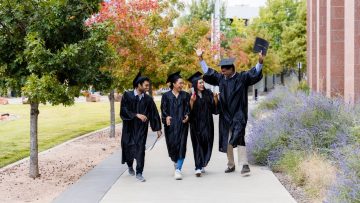Relevant and Raw: Global Education Helps Reinvent Higher Ed
Is higher education in danger of becoming irrelevant? It has been suggested that colleges and universities are not adapting to the needs and pace of the world. The IBM Institute for Business Value calls upon higher education to be in “pursuit of relevance” by prioritizing practical and applied curricula and improving educational access and experiences. Let’s face it, millennials have a sixth sense when it comes to authenticity, transparency, and engagement. They pay attention to advertising that is raw and tells it like it is. They buy products and choose opportunities that are world-connected and engaging. The Yale School of Management suggests that millennials are not easy to please because they challenge brands to be more innovative. Wouldn’t they expect the same from their college experience—an education that transcends the classroom and connects them to the world in real ways?
So, how do you know if a college is relevant? How do you know if it is keeping up with our changing world and new population of learners? Here are a few ways to check a college’s vital signs:
Global Education: a necessity, not a luxury.
A sure sign of a college’s commitment to world relevance can be found in its experiential learning offerings. If the college views the world as an extension of the classroom, and promotes global education programs, you may have a winner.
Once upon a time, “global education” simply meant “semester study abroad”—a privilege reserved for the wealthy, and an unachievable luxury for the majority. But now the world of work requires graduates of all socio-economic backgrounds to possess a certain level of multicultural competence; to connect and engage with the world in authentic and relevant ways prior to graduation. This real-world demand requires colleges to ensure equal access to international opportunities—to create new, affordable, and impactful ways for all students to encounter the world.
Faculty-Led Study Abroad Programs
While a semester abroad is still a popular choice for students, more are choosing to study abroad in short bursts via Faculty-Led Study Abroad Programs (FLSAPs). These international micro programs pack a punch. They are usually offered over spring, summer, or winter breaks, and can even incorporate a volunteer or internship experience. They can take the shape of a stand-alone course, or an embedded component in an academic course (i.e. Tropical Ecology course with a 10-day lab in Costa Rica). With an eye on world relevance, FLSAPs are old dogs doing new tricks, providing students with career-oriented, discipline-specific international experiences that are led by their trusted faculty. Students have the opportunity to live, study, volunteer, and research abroad side-by-side with their professors.
FLSAPs are in growing demand. For students who have financial and time constraints coupled with limited travel experience, FLSAPs don’t require students to leave home for four months; and they are hands-down more affordable than a semester experience. However, these high-impact international programs are not reserved for financially needy or underserved populations. Students from all socio-economic backgrounds are now seeing FLSAPs as financially viable, impactful, and in some cases, preferable ways to receive mentorship, and link academic learning to the world.
The benefits of FLSAPs for students are numerous:
- Generally less expensive than other international program options
- Discipline- and career-specific
- Build community among students and faculty
- Increase students’ self-esteem, sense of accomplishment, purpose, academic direction, and interest in leadership
- Increase motivation to graduate in a timely manner
- Gateway experiences to other international study/volunteer programs
Colleges are starting to understand that FLSAPs are one answer to bridging the gap between academics and the world, and as a result, short-term programs are popping up on campuses around the country – but not all FLSAPs do their due diligence.
How can you recognize a strong short-term international program?
- Integration with curriculum: FLSAPs should be thoughtfully linked to academic courses. Teaching and learning is transformative when it marries the experiential with the academic.
- Affordability: FLSAPs should be offered at a price-point that allows participation for all students. Payment plans and college micro loans are helpful; and FLSAPs bundled in the cost of a course may allow students to use their financial aid to defer the costs of the program.
- Pre-Departure Orientation & Preparation: FLSAPs should require a pre-departure orientation program for students and faculty, along with academic and cultural research that will help prepare them for their experience.
- The Raw Factor: It is one thing for colleges to offer “trips,” but quite another to provide international educational experiences that are culturally-conscious and locally-integrated. An FLSAP that meets the needs of millennials is raw— it champions minimum impact travel, and maximizes interaction with authentic local culture. Millennials don’t want to fill their backpacks with souvenirs; they are in search of stories and unique experiences that they can post on social media or tweet home about. While FLSAPs should be designed with safety in mind, they fall short if students are kept in a bubble abroad.
- Post-Program Reflection: A weakness of most international programs is the post-program follow-up. Students come back full of stories, questions, photos, wonder, and even some disappointment. Strong FLSAPs provide students with a forum in which to “unpack” their experiences.
For example, Georgian Court University is using digital storytelling, a way to sit around the virtual campfire with contemporary learners to reflect and share their global experiences. A strong post-program reflection should bring students together, help them create community, and allow them to be candid and even vulnerable about their triumphs and challenges abroad.
Millennials and their “brave new world” are challenging higher education to reassess and reinvent. Context is now rivalling content and micro-learning is becoming the accepted avant-garde. To remain relevant, colleges must be humble and brave enough to listen to those they were created to serve. “Experiential,” “authentic,” “purpose-driven,” and “innovative”—these are the words millennials are using to describe the education they want and need. If colleges are too slow to adapt, “Life is short,” millennials will say. “We’ll just shop around or go somewhere else.”
Georgian Court University |
LAKEWOOD, NEW JERSEY |
| Georgian Court University, established in 1908, provides a comprehensive education in the Mercy Catholic tradition. Located in Lakewood, NJ, GCU advances a curriculum that is broad enough to be truly liberal, yet specialized enough to provide in-depth preparation for careers or further study, offering 30 undergraduate degrees, 10 graduate degrees, and a variety of certificates. As part of its mission, GCU devotes significant academic and financial resources to serving high-need, underserved students, many of whom are the first in their family to attend college. Centered on the core Mercy values of respect, integrity, justice, compassion, and service, GCU offers a nurturing campus environment with individualized attention and guidance. |



